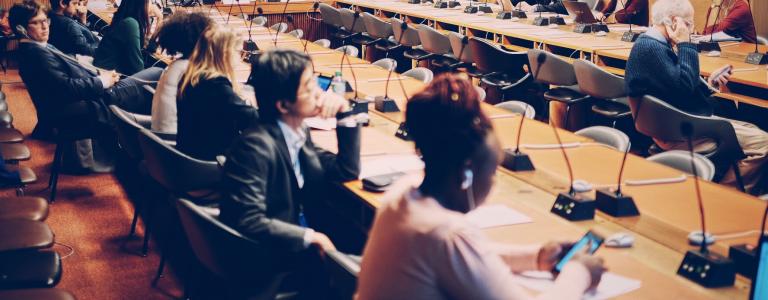The Role of a Future Binding Instrument on TNCS and OBES with Respect to Human Rights in Providing Inclusive Remedies in Investment-related Disputes
IISD & the Durham Law School hosted a side event during the third session of the OEIGWG on Transnational Corporations and Other Business Enterprises on how a binding instrument could address human rights.
The International Institute for Sustainable Development & the Durham Law School hosted a side event during the third session of the OEIGWG on Transnational Corporations and Other Business Enterprises.
The past decade has witnessed an exponential increase of investment-related disputes involving foreign investors, host states and local communities. The resolution of these disputes is a challenge for the international community. Transnational corporations and other investors resort to international arbitration to challenge a wide range of government measures. Although many of these disputes involve projects with significant impact on local communities, the voices of these communities are seldom heard and virtually never taken into consideration in these disputes. How can we address this gap? What are the remedies currently available to affected communities when international investment disputes arise and their interests are at stake? What can be done to ensure their access to meaningful intervention?
By looking at these and other related questions, this session had two objectives. The first was to highlight the challenges preventing local communities’ voice from being heard before, during and after a foreign investment takes place. This problem is exacerbated where foreign investors resort to investment arbitration. The second was to explore how a future binding instrument on transnational corporations and other business enterprise with respect to human rights could address these issues and provide concrete ways to overcome the challenges. For more information please read the meeting report.
October 24, 2017
13h00-15h00
Palais des Nations, Room XXVII
AGENDA
13:00 Introduction and opening remarks
- Ms. Nathalie Bernasconi, Group Director, Economic Law & Policy, International Institute for Sustainable Development (IISD)
13:15 Reflection from stakeholders
- Mr. Budi Afandi, Advocacy Coordinator, Indonesia for Global Justice (IGJ)
- Mr. Luis Espinosa-Salas, Minister, Permanent Mission of the Republic of Ecuador in Geneva
- Mr. Carlos Lopez, Senior Legal Adviser, International Commission of Jurist (ICJ)
- Mr. Nicolás Perrone, Assistant Professor in International Law, Durham Law School
- Ms. Makbule Sahan, Director, Legal Unit, International Trade Union Confederation (ITUC)
14:15 Open discussion

